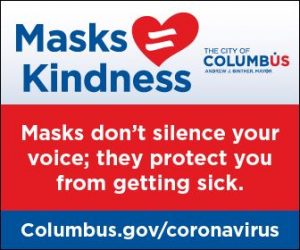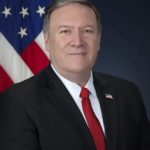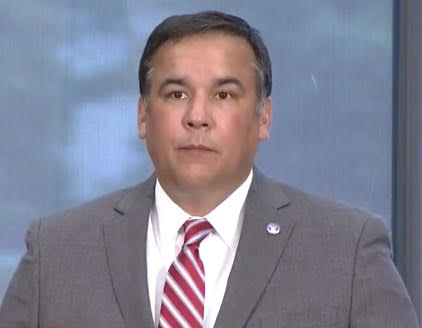- Calls all residents to play a role
Ohio City of Columbus Mayor Andrew Ginther has pledged to move from 20th century law enforcement to 21st century community policing that protects every resident.
“From an old model of policing to a new model that protects every resident. And we are creating a city that fights racism and discrimination and builds equity,” said Mayor Andrew Ginther.
Speaking at a media event on recent happenings and upcoming plans for the city, Mayor Andrew J. Ginther acknowledged that every resident in the city has a role to play.
“This is not a solo journey. All of us have a role to play, and I’m calling on each of you:
- To our police officers: many of you entered into this profession to protect and serve . . . many of you work tirelessly every day to do just that and to build meaningful relationships with our residents. To those officers – keep serving admirably. And if you see other officers using excessive force or outdated training methods, intervene immediately. To those officers who do not serve our community in the ways we expect, we do not have room for you in the Columbus Division of Police and you will be held accountable.
- To the FOP: Be part of the solution. Be part of the reform our community is demanding, starting by helping with the formation of a Civilian Review Board. You’re either with us or against…I hope you will be with us.
- To other elected officials – at the federal, state and local level: Change at all levels is needed. Work with me to make change.
- To young people: Keep lifting your voices in the classroom, in your neighborhood and even at the ballot box. Register to vote — and exercise your right to vote.
- To media: Keep reporting – and cover stories from all sides.
- To the community: Join with me in calling for change with CPD policies and rooting out the voices within who want to maintain the status quo.
On the societal demands of the Police department, Mayor Ginther said, “they are probably asking officers to deal with all society’s problems. One of the things we are looking at right now is using our non-uniform response like de-escalation experts, social workers and nurses.”
“What about a neighborhood dispute, do we really need a uniformed officer where somebody calls to settle a dispute between where a yard starts and ends? “
“Asking our police officers to be nurses, counselors, psychologists and law enforcement professionals is unfair and I think there is a larger role in our community for non-uniformed de-escalation experts who can help solve some of these problems so that our police can best focus on the most critical public safety issues.”
Mayor Ginther agreed on the need to change and “reform the divisional police. We need them, the families of this community need them, but we also need them to change.”
On calls for de-funding the police department,Mayor Ginther said, “I don’t view this as a conversation of taking money from law enforcement. I see this as adding resources and benefits as we reform law enforcement and change law enforcement. They can focus on the most serious crises and threats that are out there and these other folks professionally trained can help meet can help meet the other community’s needs.”
“I hear them, and I know where they are coming from. I do not believe in the de-funding of the divisional police. I do believe in reforming the divisional police. I do believe in putting additional resources, essentially through public private partnerships to better handle and meet the needs, with mental health, addiction and other challenges in our community.”
“Our law enforcement officers are not necessarily trained to handle all of those situations and they are out there to – all our society’s problems. That is all of our responsibilities.”
On the recent encounters between the police and protesters, Mayor Ginther said, “what our officers are encountering later in the night is a much smaller group of people who are involved in criminal activities – blocking off traffic, harassing motorists, in some cases, assaulting police officers. That is unacceptable.”
“Unacceptable use of force, excessive use of force by my officers is not acceptable but we are not going to stand by and let criminals put our officers at risk.”
“We are working on individual approach based on the groups and individuals we are dealing with now than we’ve had in weeks past. What we’ve seen in a couple of nights are folks who are assaulting police officers.”
“We need to make sure that we are taking care of our officers. Based on my conversation with the divisional police, I am assured that things are getting  better.”
better.”
He said that “This is where the community is. We want change and reform. We want oversight and accountability and this not about whether the Fraternal Order of Police, FOP chooses to work with me this is what the community is demanding. If we do not see the justice and reform and change that we need I know that this community will hold them accountable.”
The full text of Mayor Andrew Ginther’s speech below:
The death of George Floyd was a modern-day lynching – and I am outraged at his death and the countless other black men and women who have died at the hands of the police.
I am furious that in 2020 we are fighting the same battles, for the same causes, that our parents and grandparents marched for over 50 years ago.
I have been very clear that I believe racism exists in every facet of our culture. This is not unique to Columbus. Unfortunately—it is universal.
There are elements that deny racism exists — including some within the Division of Police. Some in our community feel protected; others feel policed.
There are people with the Division who aren’t interested in change, who will seek to fight it.
But I know racism exists and that police brutality against black and brown people exist.
Consider this:
An incompetent office worker gets fired.
An unethical attorney gets disbarred
A poorly trained surgeon faces a malpractice suit or loses their license.
But at the hands of a racist, rogue police officer people die.
I am fighting to deal with it head on . . . and I will not accept the status quo.
I have been fighting for police reform since Day One of my first term.
- Implemented body-worn cameras;
- Committed to increase the diversity of police by 50% and advanced extensive recruitment strategies. Our last three classes have been the most diverse and highest scoring in a decade.
- Formed the Comprehensive Neighborhood Safety Strategy to address crime not just with law enforcement but with Columbus Public Health and the Department of Neighborhoods.
- Required more police officers to undergo Crisis Intervention Training.
- Received the recommendations on reform from the Columbus Community Safety Advisory Commission and Matrix Consulting – an independent third-party firm to study the Columbus Division of Police.
These are all steps in the right direction, but we know there is much more to do.
Like you, I have seen images and videos over the last several weeks that disturb me – including the pepper spraying of non-violent activists, media and elected officials.
Let me be clear: Some of these images and videos don’t live up to my expectations, or our community’s expectations – of police, and of each other.
My conversations with our neighbors, activists or other elected leaders have informed our response, and every decision I make as we work to navigate these unprecedented times. We are, and we will get through this together, stronger and better for it.
Over the years, I have talked to a lot of people from a lot of neighborhoods about what they want and need from their city.
I heard residents say they felt left out of the prosperity of Columbus . . . and they told me that my job as mayor is to close the divide. Those opinions led to what are now my top priorities – The Equity Agenda, an agenda that calls out racism and discrimination where it exists and my plans to address it. But what does that really mean?
- It means reducing infant mortality by making sure black babies reach their first birthday and beyond;
- It means ensuring access to high-quality pre k, regardless of your zip code;
- It means working to reduce evictions where we know black mothers are disproportionately impacted; and increasing the availability of affordable housing;
- It means creating more opportunities for black owned and women owned businesses to have equal access to city contracts;
- It means connecting residents to good paying careers in the trades; and
- It means ensuring our residents feel safe wherever they go . . . including their interactions with police – because there is no greater inequity than the brutality that can happen at the hands of police officers.
2020 has been a year like no other we’ve ever seen. A pandemic that caused a health crisis, a human services crisis and an economic crisis . . . plus civil unrest. But even with its unprecedented challenges, I see opportunity. I’m inspired by the urgent voices that have been raised . . . the emergence of new leaders . . . of young people and the outcry for change.
Real change. Not talk. Not promises. But action . . . progress.
I want to thank all of the individuals and groups who made time to meet with me over the last couple of weeks. Sometimes difficult, yet meaningful conversations with students, activists, parents, officers, members of the LGBTQ, faith and business have led to the following concrete steps we’ve taken:
- We signed on to former President Barack Obama’s Mayoral Pledge and committed to review, engage, report and reform common-sense limits on police use of force.
- I signed an executive order that implements landmark reform to mandate independent, third party investigations by the Bureau of Criminal Investigations into police-involved deaths.
- I directed Chief Quinlan to stop using tear gas and pepper spray to disperse non-violent, non-aggressive crowds.
- We seated the Chief’s Advisory Panel to guide Chief Quinlan in policy changes.
- And we signed on to 8 Can’t Wait, committing to 8 data-driven reforms to instill more restrictive use-of-force policies within the police.
- I am committed to set up a Civilian Review Board with meaningful oversight authority by the end of the year.
- And we will hire an independent investigator to review the overall response to protests since the end of May.
I will take more action in the coming days and weeks. We must continue to build on the already overwhelming community support to enact change that is significant, substantial and swift.
We are working now to continue to implement the changes by the Safety Advisory Commission and the Matrix report – for better recruiting, training and accountability of police officers. And we will soon have a public facing tracking system so residents can see the progress we are making at any time, in real time.
We have made some missteps, too – I made some, and so did the police. Progress is messy. Mistakes will be made. It is critical that we own the mistakes we make, learn from them and pivot to solutions.
I set up a hotline outside of the chain of command of police to investigate community complaints. All of the complaints are being reviewed by the Department of Public Safety and a faith leader. For the first time, we will hire an independent law firm to investigate the complaints that may deserve administrative discipline . . . and a separate law enforcement entity – outside of the Columbus Division of Police – to review those complaints that may demand criminal charges.
Body-worn cameras have turned out to be an excellent tool in holding the police and the city accountable. But the protests of the last few weeks showed their limitations. We are working to correct this so that cameras can always be worn as intended.
I know how important the Civilian Review Board is to the community – it is to me, too. We will have a work group formed next week to shape our Review Board. And I am calling on the FOP to be part of the process the community demands. But with or without you, we will establish a Civilian Review Board by the end of the year.
We are on a path to move from 20th century law enforcement to 21st century community policing – from an old model of policing to a new model that protects every resident. And we are creating a city that fights racism and discrimination . . . and builds equity.
This is not a solo journey. All of us have a role to play, and I’m calling on each of you:
- To our police officers: many of you entered into this profession to protect and serve . . . many of you work tirelessly every day to do just that and to build meaningful relationships with our residents. To those officers – keep serving admirably. And if you see other officers using excessive force or outdated training methods, intervene immediately. To those officers who do not serve our community in the ways we expect, we do not have room for you in the Columbus Division of Police and you will be held accountable.
- To the FOP: Be part of the solution. Be part of the reform our community is demanding, starting by helping with the formation of a Civilian Review Board. You’re either with us or against…I hope you will be with us.
- To other elected officials – at the federal, state and local level: Change at all levels is needed. Work with me to make change.
- To young people: Keep lifting your voices in the classroom, in your neighborhood and even at the ballot box. Register to vote — and exercise your right to vote.
- To media: Keep reporting – and cover stories from all sides.
- To the community: Join with me in calling for change with CPD policies and rooting out the voices within who want to maintain the status quo.
President Barack Obama said “Change will not come if we wait for some other person or some other time. We are the ones we’ve been waiting for. We are the change that we seek.”
Progress is a journey, not a destination. I invite you to join me on this journey.
We are at crossroads and the path we take is up to us.
































Leave a Reply
You must be logged in to post a comment.